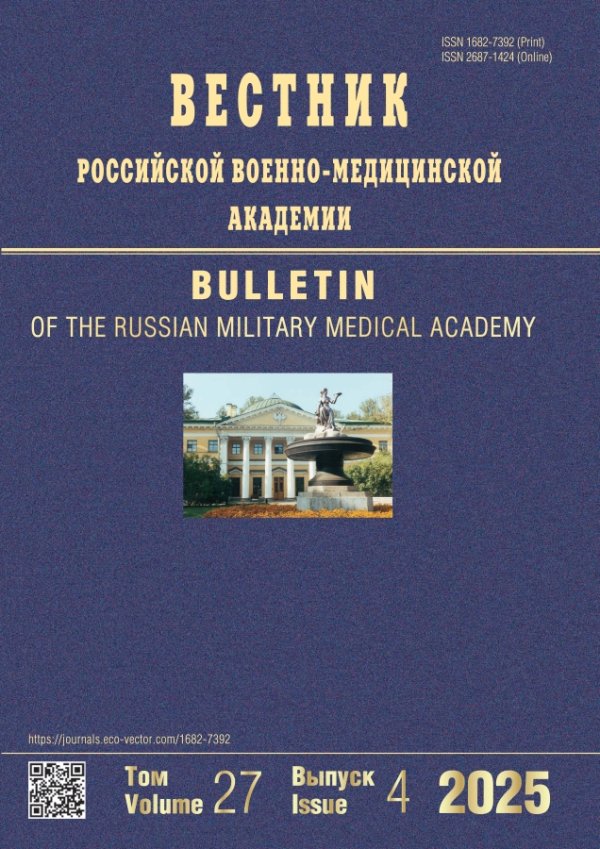Dynamics of recovery of speech and cognitive impairment in different periods of ischemic stroke
- Authors: Guzeva VI1, Bykova ON1, Guzeva VV1, Guzeva OV1, Smirnova VV1, Pavlova NV2
-
Affiliations:
- Санкт-Петербургский государственный педиатрический медицинский университет
- Одесская национальная академия пищевых технологий
- Issue: Vol 20, No 3 (2018)
- Pages: 46-49
- Section: Articles
- URL: https://journals.rcsi.science/1682-7392/article/view/12229
- DOI: https://doi.org/10.17816/brmma12229
- ID: 12229
Cite item
Full Text
Abstract
Full Text
##article.viewOnOriginalSite##About the authors
V I Guzeva
Санкт-Петербургский государственный педиатрический медицинский университет
Email: nevroloq_o25@mail.ru
Санкт-Петербург
O N Bykova
Санкт-Петербургский государственный педиатрический медицинский университетСанкт-Петербург
V V Guzeva
Санкт-Петербургский государственный педиатрический медицинский университетСанкт-Петербург
O V Guzeva
Санкт-Петербургский государственный педиатрический медицинский университетСанкт-Петербург
V V Smirnova
Санкт-Петербургский государственный педиатрический медицинский университетСанкт-Петербург
N V Pavlova
Одесская национальная академия пищевых технологийОдесса
References
- Белопасова, А.В. Восстановление речи у больных с постин- сультной афазией и механизмы нейропластичности / А.В. Белопасова [и др.] // Неврологический журнал. - 2011. - Т. 16, № 1. - С. 37-41. 48 3 (63) - 2018 ВЕСТНИК РОССИЙСКОЙ ВОЕННО-МЕДИЦИНСКОЙ АКАДЕМИИ Клинические исследования
- Вахнина, Н.В. Постинсультные когнитивные нарушения / Н.В. Вахнина [и др.] // Журн. невролог и психиатрии им. С.С. Корсакова. Прилож. к журналу. - Вып. 22. - 2008. - С. 16-21.
- Визель, Т.Г. Как вернуть речь / Т.Г. Визель. - М.: ЭКСМО-пресс, 2001. - 224 с.
- Танашан, М.М. Терапия когнитивных нарушений при церебро- васкулярных заболеваниях: новые факты / М.М. Танашан [и др.] // Неотложные состояния в неврологии: тр II Нац. Конгр. - М., 2011. - С. 131-135.
- Тул, Дж.Ф. Сосудистые заболевания головного мозга: ру- ководство для врачей / Дж.Ф. Тул. - М.: ГЭОТАР-медиа, 2007. - 590 с.
- Шахпаронова, Н.В. Реабилитация больных с постинсультной депрессией / Н.В. Шахпаронова [и др.] // Журн. невролог. и психиатрии. Спец. выпуск. - 2007. - С. 294-295.
- Barba, R. Poststroke dementia: clinical features and risk factors / R. Barba [et al.] // Stroke. - 2000. - Vol. - 31. - P. 1494-1501.
- Bassett, D.S Human brain networks in health and disease / D.S. Bassett [et al.] // Curr Opinion Neurol. - 2009. - Vol. 22. - P. 340-347.
- Copland, D.A. Meaning selection and the subcortex: evidence of reduced lexical ambiguity repetition effects following subcortical lesions / D.A. Copland // J. Psycholinguist. Res. - 2006. - Vol. 35, № 1. - P. 51-66.
- Sivakumar, L. Serial montreal cognitive assessments demonstrate reversible cognitive impairment in patients with acute transient ischemic attack and minor stroke / L. Sivakumar [et al.] // Stroke. - 2014. - Vol. 45, Iss. 6. - P. 1709-1715.
- Verstraeten, S. Motor and cognitive impairment after stroke: a common bond or a simultaneous deficit? / S. Verstraeten [et al.] // Stroke research and therapy. - 2016. - Vol. 1, № 1. - P. 1-10.
- Yang, S.R. Predictors of early post ischemic stroke apathy and depression: a cross- sectional study / S.R. Yang [et al.] // BMC Psychiatry. - 2013. - Vol. 13. - P. 164-174.
Supplementary files







